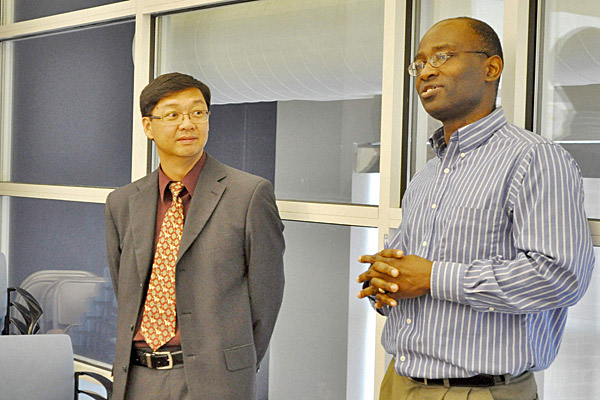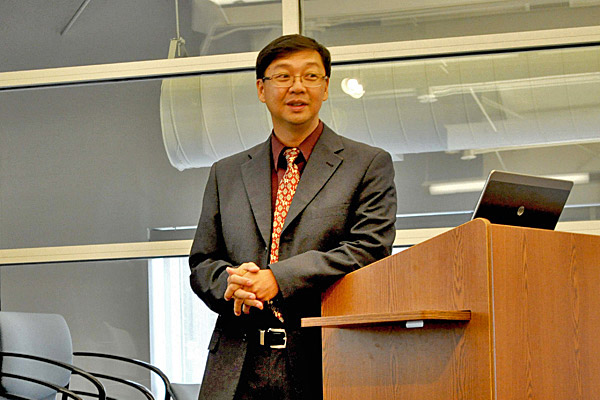


Food or fuel
UFLA's Sugano speaks to UD community about Brazilian agriculture
10:06 a.m., March 19, 2012--Continuing a strong partnership with the University Federal de Lavras (UFLA) in Brazil, the University of Delaware College of Agriculture and Natural Resources (CANR) Department of Food and Resource Economics hosted a special guest speaker last week.
Joel Sugano, a UFLA professor, gave a talk in Townsend Hall on Thursday, March 15, focusing on “Developing Business in Brazil through Innovation: The Case of Brazilian Business Platform in Ethanol, Coffee and Seed Industries.”
Global Stories
Fulbright awards
Peace Corps plans
Sugano discussed problems that face global agriculture as population and affluence increases. As affluence rises, Sugano noted that there will be more people looking to buy more products and he asked the question, “Can you say to consumers, ‘You cannot consume?’ To tell someone, ‘You cannot buy a new car,’ that’s impossible.”
Sugano said that a rising world population has increased the need for food and renewable energies, and countries are being faced with a tough decision regarding whether to use their land for fuel or for food.
Sugano noted that in 2000, 1 percent of the world’s grain consumption was used for biofuels, as opposed to 2010 when that number jumped up to 6 percent.
He used Brazil as an example of this, noting that land that was once allocated for growing food has now been used to grow sugar cane in order to meet the world’s growing ethanol demands.
Sugano also noted that Brazil will play a key role in the global food crisis, as the nation is among the leading global exporters of goods such as coffee, orange juice, poultry and sugar cane.
Although there could be cause for alarm due to the potential gap in the world's growing population and scarcer and more expensive food products, Sugano said that there is reason to be optimistic. He said that the world’s food crisis presents great challenges but also great opportunities for new innovations in agricultural business, which could help mitigate higher global food demand.
Time at UD
This is the second time that Sugano has visited UD. His first visit came in fall 2010 and he said he has fond memories from his time at UD.
Sugano also said he believes the partnership between UD and UFLA “is a door that will open to new possibilities to research, business, the exchange of knowledge and the exchange of ideas.”
Continuing, Sugano said, “the most important research is knowledge and the knowledge can come from any part of the world. If we build such a platform that we can exchange knowledge through this kind of collaboration between universities, we can create the platform to exchange ideas. That is more important than goods and so forth. Without this collaboration, I never would have been able to meet Titus (Awokuse) or other faculty here to exchange ideas and to show what we are doing and then to see what is going on here.”
Sugano said the experience for UD students to study at UFLA and vice versa is one that will benefit both universities, as well. “The important thing about study abroad is that it’s not only about knowledge but it’s about the experience itself. This kind of experience will last for their entire life.”
As the need to come up with solutions on a global basis increases, so too does the importance of studying abroad, according to Sugano. “The effects of one change in one thing will be sensed in another totally different area of the world because of the relationship that has been created through the Internet and through communication.”
To solve global problems, Sugano said, “we need expertise and knowledge and this will be done and exchanged through several different points of view. Not only in one country, but in another country that has another perspective, I think that will be the next way to solve problems.”
While at UD, Sugano also gave guest lectures in two undergraduate classes and visited with other faculty and state officials. He met with David Weir, director of UD's Office of Economic Innovation and Partnerships; Matt Robinson, director of UD's Institute for Global Studies; and David Mathe, deputy director of international trade and development for the state of Delaware.
About the partnership between UD and UFLA
In 2011, CANR and the College of Arts and Sciences received a $150,000 grant from the United States Department of Agriculture’s National Institute of Food and Agriculture and International Science and Education program (USDA-NIFA-ISE) to continue on a three-year partnership with UFLA.
The hope of this partnership is to establish both long-standing academic programs and research partnerships, with both institutions helping each other in those areas in which their research overlaps.
Ranked fourth overall among universities in Brazil in a recent poll, UFLA is equipped with state of the art facilities, 160 laboratories and two experimental farms.
Article by Adam Thomas
Photos by Christy Mannering









